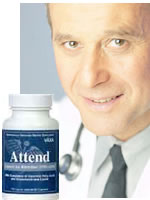| Attention Deficit Hyperactivity Disorder is a neurologically based disorder. Children, teens, and even adults with ADD or ADHD often have problems with paying attention to boring work, such as most school work, although they may do well with exciting or stimulating tasks. Many with ADD ADHD are also impulsive, doing or saying things without first considering the consequences. People with Attention Deficit Disorder are typically easily bored.
About half of those with ADD ADHD are also "hyperactive," meaning that they have high levels of motor activity. They like to move around a lot. They often move around from one activity to another, without ever finishing things that they start.
There are six different "types" of ADHD. Learn about the different types of ADHD and specific treatment strategies here...
ADD ADHD Attention Deficit Hyperactivity Disorder is a brain thing.
Yes, it is a matter of poor self-control, but in the neurological sense rather than the "moral" sense. Self-control is a neurological issue. Individuals with ADD ADHD tend to have slower brainwave activity in the front regions of the brain, which is the part of the brain that helps us to decide what to pay attention to in the world around us.
Of course, it is not just this simple. There are often several regions in the brain that are impacted, and several neurotransmitters are also involved. But the important thing here for parents and teachers to remember is that a child who truly has Attention Deficit Disorder was born with the problem. It is not just a matter of the child being lazy, bored, or lacking self-control on purpose.
ADHD or ADD impacts about two students in every classroom, in every school, across America.
Estimates for Attention Deficit Disorder - "ADD" or "ADHD" - range from 5% to 25% of the population.
The most accurate number is 5% of the childhood and adolescent population. About 2% of adults are also affected by Attention Deficit Disorder from their childhood.
Yes! There are many things that can be done to help those with ADD ADHD. There are several good clinical interventions, ranging from medications to non-medication treatments. These classroom interventions are also very helpful! Be sure to look at the resources available below.
Interventions for:
ELEMENTARY SCHOOL
JUNIOR HIGH / HIGH SCHOOL
What Teachers should know about MEDICATIONS FOR ADHD in the classroom Locate Information on RITALIN ALTERNATIVES
|


